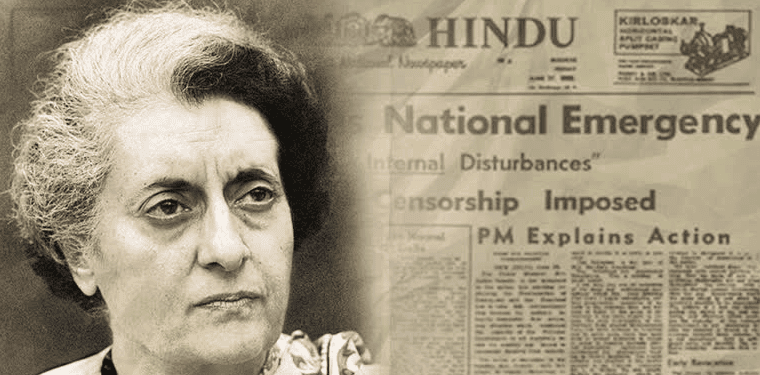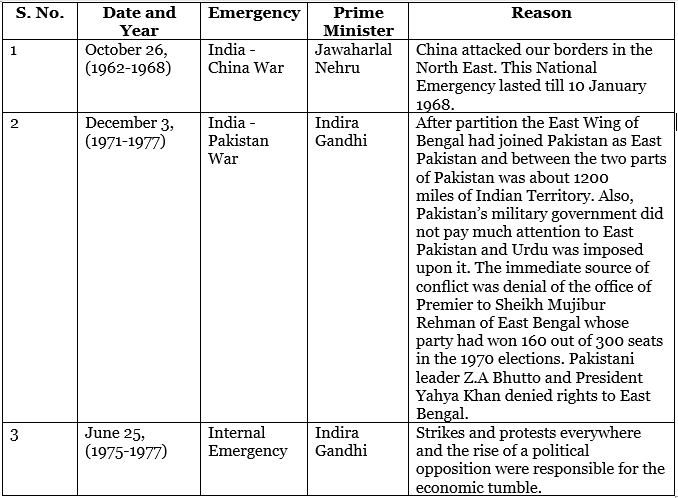National Emergency | General Awareness - Bank Exams PDF Download
Understanding National Emergency in India

- National Emergency (Article 352)
- President’s Rule/State Emergency (Article 356)
- Financial Emergency (Article 360)
When the term “proclamation of emergency” is used constitutionally, it specifically refers to the declaration of a national emergency under Clause (1) of Article 352.
Grounds for Imposition of National Emergency
The Constitution of India outlines specific grounds for the declaration of a national emergency. These grounds are primarily related to threats to the security of the nation. Here’s a detailed explanation:
Grounds for Proclamation
- According to Article 352 of the Constitution, the President of India can declare a national emergency when there is a threat to the security of India or any part of it due to:War, External Aggression, or Armed Rebellion.
- The President has the authority to declare a national emergency even before the actual threat materializes if there is a reasonable belief that the safety of India or any part of it is at risk.
Types of Emergency
The national emergency is classified into two types based on the grounds for imposition:
- External Emergency: This type of emergency is declared in response to threats from war or external aggression.
- Internal Emergency: This type of emergency is declared in response to armed rebellion within the country.
38th Constitutional Amendment Act 1975
The 38th Constitutional Amendment Act of 1975 introduced additional provisions regarding the grounds for imposing a national emergency:
- The President can issue different proclamations of national emergency on different grounds simultaneously.
- The declaration of emergency by the President is non-justiciable, meaning it cannot be challenged in a court of law.
- During an emergency, the President has the power to suspend the right to approach the court for the enforcement of fundamental rights.
Procedures for Approval and Duration of a National Emergency
When a National Emergency is proclaimed under Article 352, the following procedures for approval and duration come into play:
Approval Process:
- The proclamation of a National Emergency must be laid before each house of Parliament.
- It requires approval by both houses with a special majority.
- Within one month from the date of proclamation, both houses of Parliament must ratify the emergency.
- If the Lok Sabha is not in session or has been dissolved before the one-month period expires,approval must be obtained within 30 days from the first sitting of the newly constituted Lok Sabha. However, this is contingent on the Rajya Sabha approving it in the meantime.
Duration of the Emergency:
- Once approved, the National Emergency is typically in effect for six months.
- The proclamation can be extended indefinitely, but each extension requires parliamentary approval by a special majority every six months.
Impact of National Emergency Imposition
The declaration of a National Emergency significantly and broadly impacts the political structure of the government.
Effect on Centre-State Relations
During a National Emergency, the normal fabric of centre-state relations undergoes a fundamental change, which can be examined under three heads:
- Executive: During a National Emergency, the centre's executive authority extends to advising any state on how to exercise its executive authority. Normally, the union is limited to giving states directives on a small number of specific issues. As a result, even though state governments are not suspended, they are brought under the total supervision of the federal government.
- Legislative: The Parliament has the authority to enact laws on any item included in the state list during a National Emergency. Although a state legislature's legislative authority is not suspended, it becomes subject to Parliament's veto power. After the emergency is lifted, the legislation passed by Parliament regarding state matters will no longer be in effect.
- Financial: During a National Emergency, the President is empowered to modify the provisions regarding the distribution of revenues between the Union and the States. Each of the President's orders in this regard must be presented to both houses of Parliament.
Impact on the Life of the Lok Sabha and State Assembly
When a National Emergency is proclaimed, it also alters the functioning of legislative bodies at both the central and state levels:
- Prolonging Lok Sabha: While a National Emergency is in effect, the life of the Lok Sabha may be extended beyond its regular term for periods of up to one year at a time. This extension, however, is only valid for a maximum of six months after the emergency has ended.
- Prolonging State Assembly: Similarly, during a National Emergency, Parliament may repeatedly extend the normal term of a state Legislative Assembly by one year, up to a maximum of six months after the situation has ended.
Effect on Fundamental Rights
The impact of a National Emergency on fundamental rights is outlined in Articles 358 and 359 of the Constitution.
- Article 358: Suspension of Fundamental Rights under Article 19 The six fundamental rights under Article 19 are immediately suspended when a proclamation of national emergency is made under Article 358 on the grounds of war and external aggression. Their suspension does not require a separate President's order. If the emergency is declared on the grounds of internal rebellion, the fundamental rights are not suspended automatically. Any law made or any executive action abridging the six fundamental rights is immune from judicial review. However, no remedy can be sought, even after the cessation of emergency, for any law or action taken to abridge the six fundamental rights.
- Article 359: Suspension of Other Fundamental Rights The President is authorized to suspend the right to petition any court for the enforcement of fundamental rights. However, the right to judicial remedy for the enforcement of Articles 20 and 21 cannot be suspended in any case. The suspension of enforcement relates only to those fundamental rights specified in the presidential order.
National Emergency Provisions Before and After the 44th Constitutional Amendment Act
Changes Brought by the 44th Amendment to Emergency Provisions:
Grounds for Imposing Internal Emergency:
- Before Amendment: Emergency could be imposed due to "internal disturbances."
- After Amendment: The term was replaced with "armed rebellion," making the grounds for internal emergency stricter.
Conditions for Declaration:
- Before Amendment: No requirement for a written recommendation for declaring an emergency.
- After Amendment: A written recommendation from the Cabinet is now mandatory to declare an emergency.
Parliamentary Approval:
- Before Amendment: Approval had to be obtained within two months of the proclamation.
- After Amendment: Approval is now required within one month of the proclamation.
Majority Required for Approval:
- Before Amendment: Approval could be granted with a simple majority in Parliament.
- After Amendment: A special majority is now needed for approval.
Duration and Continuation of Emergency:
- Before Amendment: Emergency could continue indefinitely without re-approval.
- After Amendment: Emergency can only continue if reapproved every six months.
Revocation of Emergency:
- Before Amendment: Emergency could only be revoked by the President with a subsequent proclamation.
- After Amendment: Apart from presidential revocation, the Lok Sabha can pass a simple majority resolution to disapprove the proclamation. The emergency automatically expires after six months unless a fresh resolution for its continuance is adopted by Parliament.
Article 358 - Suspension of Fundamental Rights under Article 19:
- Before Amendment: Article 19 rights could be suspended irrespective of the emergency's grounds.
- After Amendment: Article 19 rights can only be suspended if the emergency is due to war or external aggression. Only laws related to the emergency are immune from judicial review.
Article 359 - Protection of Rights to Judicial Remedy (Articles 20 and 21):
- Before Amendment: No specific mention of judicial remedies for rights under Articles 20 and 21.
- After Amendment: The right to judicial remedies under Articles 20 and 21 is explicitly protected. Only laws related to the emergency are immune from judicial review, while other laws remain subject to it.
The National emergency has been proclaimed three times in India so far:

|
365 videos|701 docs|149 tests
|
FAQs on National Emergency - General Awareness - Bank Exams
| 1. What are the grounds for the imposition of a National Emergency in India? |  |
| 2. What are the procedures for approval and duration of a National Emergency in India? |  |
| 3. What is the impact of the imposition of a National Emergency on fundamental rights? |  |
| 4. How did the 44th Constitutional Amendment Act change the provisions related to National Emergency in India? |  |
| 5. Can the imposition of a National Emergency be challenged in the courts? |  |






















